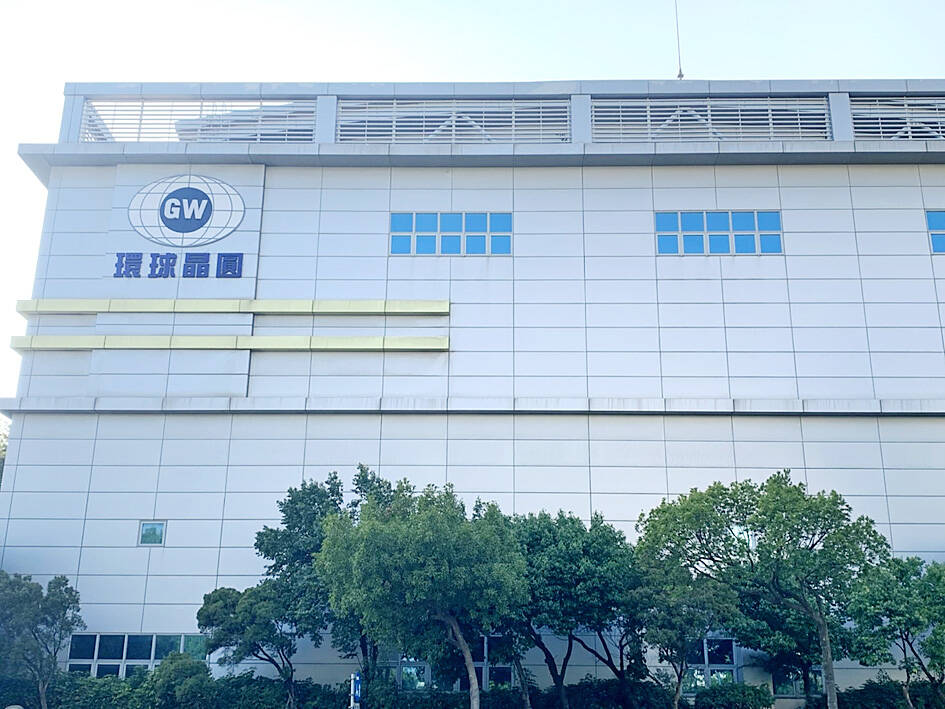GlobalWafers Co (環球晶圓), the world’s No. 3 silicon wafer supplier, on Tuesday posted a record profit for last year on the back of more long-term supply agreements (LTA) with customers, despite industry headwinds.
Net profit grew 28.6 percent to NT$19.77 billion (US$626.2 million), compared with NT$15.37 billion in 2022. Earnings per share jumped to NT$45.41 from NT$35.31 the previous year.
Last year, revenue grew for the third straight year, up 0.5 percent to NT$70.65 billion, an all-time high, but gross margin dropped to 37.4 percent from 43.2 percent the previous year.

Photo: Grace Hung, Taipei Times
“Despite the semiconductor industry in 2023 facing a global economic slowdown and lower demand for consumer electronics, coupled with increased inventory pressure, GlobalWafers benefited from a high proportion of LTAs,” the company said in a statement.
The company said it maintained high factory utilization rates last year for float-zone silicon wafers and compound semiconductor wafers, and is positive about the demand outlook this year, citing some positive factors such as leaner supply chain inventory, and new artificial intelligence (AI) smartphones, tablets and computers.
GlobalWafers said AI technology would fuel edge-computing and high-performance computing demand, while spurring the development of low-power consumption components. As a result, the semiconductor industry would likely recover gradually this year, led by the memorychip segment.
The company is positive about its growth outlook, with global semiconductor industry sales forecast to increase by 13 to 20 percent this year, driven by rising demand for AI and new telecom technologies beyond 5G, it said.
GlobalWafers said that it expects a more marked recovery in the second half of this year after customers draw down inventories.
Average LTA prices this year would be higher than last year, as the company ramps up production at new factories with higher production costs, the company said, adding that it is resilient to market volatility and continues to make profits due to its prudent operating strategy.

Shiina Ito has had fewer Chinese customers at her Tokyo jewelry shop since Beijing issued a travel warning in the wake of a diplomatic spat, but she said she was not concerned. A souring of Tokyo-Beijing relations this month, following remarks by Japanese Prime Minister Sanae Takaichi about Taiwan, has fueled concerns about the impact on the ritzy boutiques, noodle joints and hotels where holidaymakers spend their cash. However, businesses in Tokyo largely shrugged off any anxiety. “Since there are fewer Chinese customers, it’s become a bit easier for Japanese shoppers to visit, so our sales haven’t really dropped,” Ito

The number of Taiwanese working in the US rose to a record high of 137,000 last year, driven largely by Taiwan Semiconductor Manufacturing Co’s (TSMC, 台積電) rapid overseas expansion, according to government data released yesterday. A total of 666,000 Taiwanese nationals were employed abroad last year, an increase of 45,000 from 2023 and the highest level since the COVID-19 pandemic, data from the Directorate-General of Budget, Accounting and Statistics (DGBAS) showed. Overseas employment had steadily increased between 2009 and 2019, peaking at 739,000, before plunging to 319,000 in 2021 amid US-China trade tensions, global supply chain shifts, reshoring by Taiwanese companies and

Taiwan Semiconductor Manufacturing Co (TSMC, 台積電) received about NT$147 billion (US$4.71 billion) in subsidies from the US, Japanese, German and Chinese governments over the past two years for its global expansion. Financial data compiled by the world’s largest contract chipmaker showed the company secured NT$4.77 billion in subsidies from the governments in the third quarter, bringing the total for the first three quarters of the year to about NT$71.9 billion. Along with the NT$75.16 billion in financial aid TSMC received last year, the chipmaker obtained NT$147 billion in subsidies in almost two years, the data showed. The subsidies received by its subsidiaries —

Taiwan Semiconductor Manufacturing Co (TSMC) Chairman C.C. Wei (魏哲家) and the company’s former chairman, Mark Liu (劉德音), both received the Robert N. Noyce Award -- the semiconductor industry’s highest honor -- in San Jose, California, on Thursday (local time). Speaking at the award event, Liu, who retired last year, expressed gratitude to his wife, his dissertation advisor at the University of California, Berkeley, his supervisors at AT&T Bell Laboratories -- where he worked on optical fiber communication systems before joining TSMC, TSMC partners, and industry colleagues. Liu said that working alongside TSMC